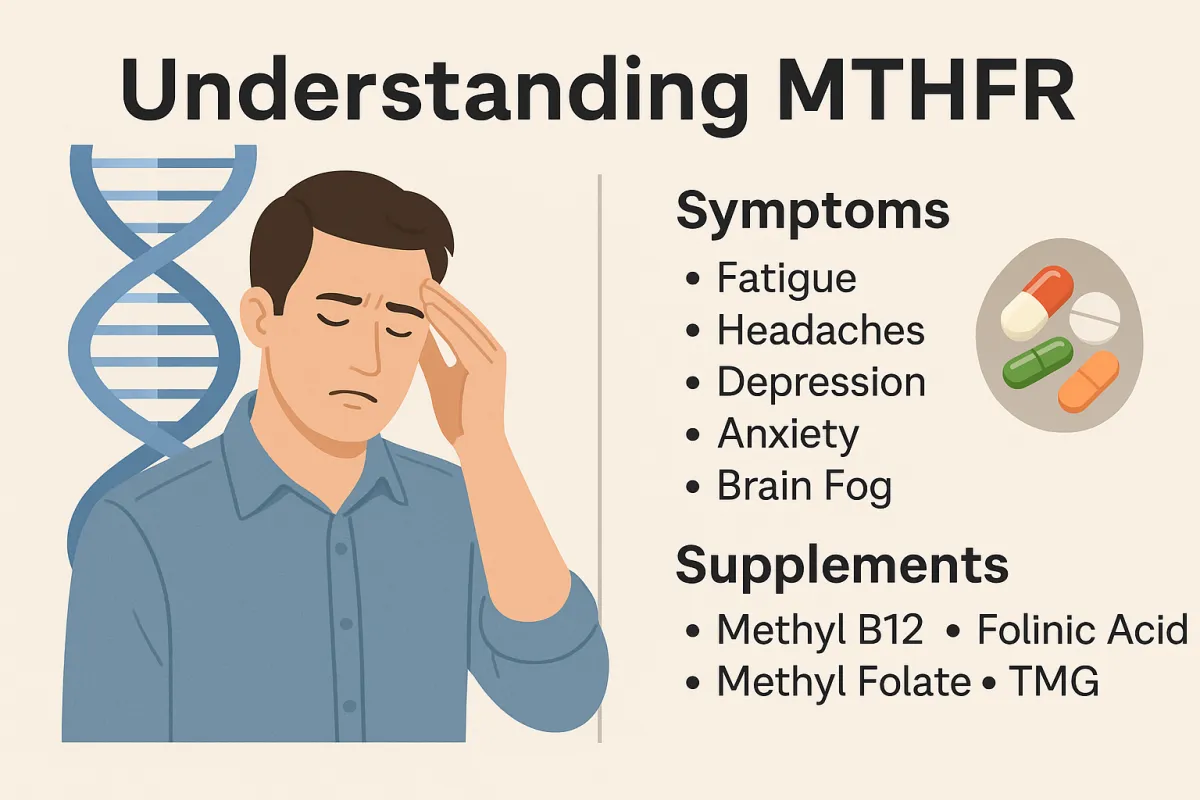
MTHFR Gene Mutation: Symptoms, Mental Health, Testing, and Treatment Options
The MTHFR gene mutation has been linked to a variety of health issues, ranging from fatigue and migraines to cardiovascular risk. But one of the most overlooked aspects of MTHFR is its potential connection to mental health conditions like depression, anxiety, bipolar disorder, and even schizophrenia.
Because MTHFR affects methylation and folate metabolism—two processes central to neurotransmitter function—it can have profound effects on mood, cognition, and emotional resilience.
At Aletheia Telehealth, we know how overwhelming this information can be. That’s why we believe in helping patients understand what MTHFR is, how to test for it, what supplements may help, and why professional guidance is essential for managing it safely.
Disclaimer: This article is for educational purposes only. It is not intended as medical advice, diagnosis, or treatment. Always consult a qualified healthcare professional before making changes to your diet, supplements, or treatment plan.
1. What Is MTHFR?
MTHFR (methylenetetrahydrofolate reductase) is an enzyme responsible for converting folate (vitamin B9) into its active form, L-methylfolate. This form is crucial for the methylation cycle, which regulates:
DNA synthesis and repair
Detoxification
Hormone balance
Energy production
Neurotransmitter creation (dopamine, serotonin, norepinephrine)
When the MTHFR enzyme doesn’t function properly, methylation slows down—leading to possible imbalances in everything from energy to mood.
2. Variants of MTHFR: C677T and A1298C
The two most common mutations are:
C677T: Strongly associated with reduced enzyme efficiency and higher homocysteine levels.
A1298C: Affects neurotransmitter regulation and can influence mood disorders.
People may inherit one (heterozygous) or two (homozygous) copies of these variants, which determines the severity of their impact.
3. Other Genes That Interact with MTHFR
MTHFR doesn’t work alone. Other genes play a role in methylation and neurotransmitter metabolism:
COMT (Catechol-O-Methyltransferase): Breaks down dopamine and estrogen. “Slow COMT” variants may lead to more intense emotions or stress sensitivity, while “fast COMT” variants may contribute to low dopamine and motivation.
MAO (Monoamine Oxidase): Breaks down serotonin and dopamine. Variants can contribute to mood imbalances depending on activity level.
MTR and MTRR: Influence B12 metabolism.
CBS: Impacts sulfur and detox pathways.
This is why many people with MTHFR also experience mood-related symptoms—the entire methylation network is interconnected.
4. Symptoms of MTHFR Mutation
While not everyone with MTHFR has symptoms, possible signs include:
Chronic fatigue
Brain fog
Anxiety or depression
Migraines
Hormonal imbalances
Fertility struggles or recurrent miscarriage
High homocysteine levels
Cardiovascular risk factors
5. Testing for MTHFR and Methylation Issues
Testing can be as simple or as comprehensive as you need it to be. Here’s how it breaks down:
Basic Testing (Good First Step)
MTHFR Gene Test: Confirms whether you carry the C677T or A1298C variants.
Homocysteine Blood Test: Elevated homocysteine is one of the most common markers of impaired methylation and cardiovascular risk.
B12 and Folate Levels: Low active B12 or folate can reveal how well your body is processing these nutrients.
These tests are often enough to identify whether MTHFR mutations may be playing a role in symptoms.
Advanced Testing (Going Deeper)
For patients with ongoing fatigue, mood disorders, or unexplained health issues, deeper testing may provide clarity:
Full Methylation Panel: Assesses how the entire folate/B12/methylation cycle is working, not just MTHFR.
COMT (Catechol-O-Methyltransferase): Helps explain dopamine and estrogen balance—important for mood, focus, and stress resilience.
MAO (Monoamine Oxidase): Reveals how efficiently serotonin, dopamine, and norepinephrine are broken down, often linked with mood and anxiety.
MTR/MTRR Genes: Provide insight into B12 recycling.
CBS and Related Genes: Influence detoxification and sulfur pathways, which can affect fatigue, gut health, and more.
Why Go Deeper?
To personalize supplementation (e.g., someone with COMT “slow” may react very differently to methyl B12 than someone with “fast” COMT).
To uncover hidden drivers of mental health issues (depression, anxiety, bipolar, ADHD, etc.).
To reduce trial-and-error—knowing your genetics helps create a safe, effective supplement plan without overmethylation risk.
6. The Mental Health Connection
How MTHFR Affects the Brain
Because methylation is necessary to create neurotransmitters like serotonin and dopamine, MTHFR mutations may reduce the availability of these “feel-good” brain chemicals.
Research Highlights:
Depression: Multiple studies link MTHFR C677T variants with higher rates of major depressive disorder. Supplementation with L-methylfolate has been shown to improve antidepressant response in some patients.
Anxiety Disorders: Impaired methylation may contribute to altered stress response and anxiety symptoms.
Bipolar Disorder: Some research suggests MTHFR polymorphisms are more common in bipolar patients, potentially due to impaired neurotransmitter regulation.
Schizophrenia: MTHFR mutations, particularly C677T, have been associated with increased risk in some populations.
ADHD and Cognitive Issues: Methylation imbalances can affect dopamine pathways, influencing focus, memory, and executive function.
While MTHFR doesn’t cause these disorders directly, it can increase susceptibility—especially when combined with environmental factors like stress, poor diet, or toxin exposure.
7. Folic Acid vs. Folate
This is one of the most important topics for people with MTHFR.
Folic acid is the synthetic form of vitamin B9 found in fortified foods and cheap supplements.
People with MTHFR mutations struggle to convert folic acid into L-methylfolate, leading to possible buildup of unmetabolized folic acid.
Better options:
L-methylfolate (active form)
Folinic acid (gentler, non-methylated form)
8. Supplements That Can Help
Methyl B12 (Methylcobalamin): Supports methylation and neurological health.
L-Methylfolate: Active folate that bypasses MTHFR enzyme issues.
Folinic Acid: Supportive, often better tolerated for sensitive individuals.
Creatine: Reduces demand on methylation pathways.
TMG (Trimethylglycine): Helps lower homocysteine and supports methylation.
Other cofactors: B2, B6, and Magnesium all play key roles in methylation.
9. The Dangers of Overmethylation
Too much of a good thing can be harmful. Over-supplementing with methylated vitamins can cause:
Anxiety and agitation
Headaches
Insomnia
Mood swings
That’s why it’s critical to personalize dosing and monitor responses carefully.
10. Why Professional Guidance Matters
Self-experimentation with methylated supplements can backfire. Working with a provider or health coach who understands MTHFR ensures:
The right testing is done
Proper supplementation without overload
Mental health symptoms are managed holistically
Lifestyle factors (diet, exercise, stress) are addressed alongside genetics
11. FAQs
Q: Does everyone with MTHFR have mental health issues?
No, but mutations may increase susceptibility. Symptoms often appear when combined with lifestyle or environmental stressors.
Q: Can MTHFR make antidepressants less effective?
Yes. Some patients with MTHFR variants respond poorly to standard antidepressants but see improvement when adding L-methylfolate.
Q: Should I avoid folic acid completely?
Yes, especially if you carry MTHFR variants. It’s better to use methylfolate or folinic acid.
Q: Is MTHFR testing worth it?
Yes—knowing your MTHFR status can help you avoid harmful supplements and choose more effective treatments.
Conclusion
MTHFR is more than a gene—it’s a piece of your health puzzle that can impact everything from energy and fertility to mental health and emotional resilience. By understanding your genetics, avoiding folic acid, and choosing the right supplements, you can make huge strides toward better health.
At Aletheia Telehealth, we specialize in guiding patients through MTHFR testing and treatment safely. Our providers and health coaches work with you to:
Identify genetic and lab markers
Personalize supplement strategies
Avoid overmethylation pitfalls
Support both physical and mental wellness
Don’t navigate MTHFR alone—schedule your consultation today and take control of your health with expert guidance.





